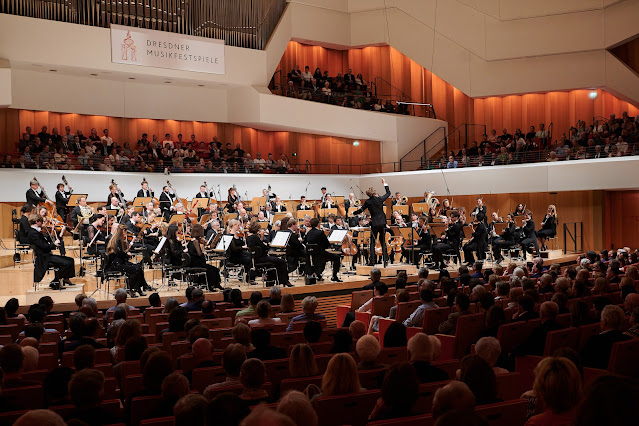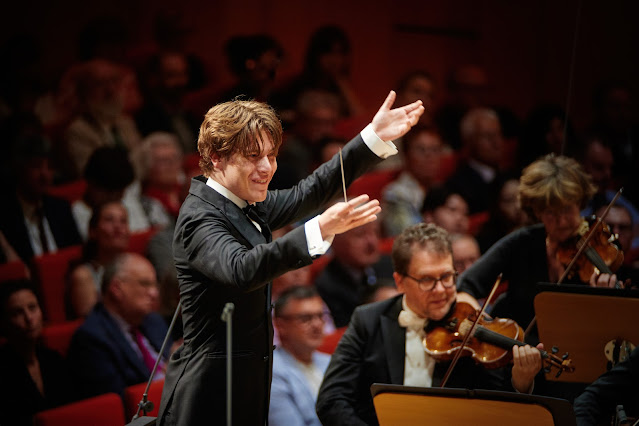 |
| Bruckner: Symphony No. 5 - Klaus Mäkelä, Royal Concertgebouw Orchestra - Dresdner Musikfestspiele at the Kulturpalast (Photo: Stephan Floss) |
Bruckner: Symphony No. 5; Klaus Mäkelä, Royal Concertgebouw Orchestra; Dresdner Musikfestspiele at the Kulturpalast, Dresden
Reviewed 10 May 2024
The Royal Concertgebouw Orchestra and its chief conductor designate bring remarkably unanimity of intent and youthful vigour to Bruckner
Anton Bruckner wrote his Symphony No. 5 in 1875-76, around the time of the first Bayreuth Festival. Whilst Bruckner revered Wagner, there is little conventionally Wagnerian about the symphony, it comes in at 75 minutes and uses relatively compact orchestral forces. But far from conventionally backward-looking, Bruckner reworks the past in his own image. So much so, that the work had to wait until 1894 for its first orchestral performance and then it was in a now discredited revision by conductor Franz Schalk.
Having begun with a new, historically informed look at Wagner's Die Walküre [see my review], the 2024 Dresdner Musikfestspiele (Dresden Music Festival) continued on Friday 10 May 2024 with Bruckner's Symphony No. 5 with Klaus Mäkelä conducting the Royal Concertgebouw Orchestra at the Kulturpalast in Dresden. A young conductor (Mäkelä is 28, born 1996) bringing a fresh look to Bruckner with a venerable orchestra of which he is chief conductor designate. The orchestra, founded in 1888, has a long tradition of the performance of music by Bruckner's friend and colleague, Gustav Mahler, dating back to Mahler's friendship with Willem Mengelberg who was the orchestra's chief conductor from 1895 to 1945.
 |
| Bruckner: Symphony No. 5 - Klaus Mäkelä, Royal Concertgebouw Orchestra - Dresdner Musikfestspiele at the Kulturpalast (Photo: Stephan Floss) |
Mäkelä and the orchestra began with a sound that was barely there, yet one could still appreciate the plush sound. Mäkelä drew a remarkable unanimity of intent from his players, Bruckner's blocks of colour strongly outlined, and he kept tight control of the tempi. When the first movement's main section started, we could appreciate the fabulous cello line, the perky details, the depth and vibrancy of the sound. Mäkelä's approach brought out the music's contrasts, strenuous v intimate, blocks of colour v rapt solos, hard edges v delicacy. There was little that was mellow and one of my colleagues, discussing the performance afterwards, opined that it was young man's Bruckner. From my point of view, Mäkelä's approach tended to highlight the commonality between the material in the four movements and the whole work felt like one, long series of preludes to the final climax. A different conductor might have staged the large paragraphs differently, given us mellower Bruckner but there was no doubting the sophistication, and vibrancy of this performance, the remarkably unanimity of intent from all concerned.
The second movement began quiet and intense, graceful yet controlled, When things opened up the sound was warm and strong, with a high sheen, but Mäkelä brought out rich detail including fine instrumental solos. The movement itself was steady and inexorable, unfolding towards a perpetually withheld climax. The third movement's restless ländler alternated with vivid contrasting sections, the playing always on point, a sophisticated machine expressing what Mäkelä wanted, with a central section bringing out the rustic dance. Here the heavenly length rather got the better of me and the movement's end, when it came, was something of a 'thank god' moment. The final movement took its time, mixing material from earlier in steady yet inexorable unfolding, vigour and restlessness alternated here, and the music had a strong feel of Bruckner saying 'Don't rush me, I'm thinking', but the climax, when it came, was remarkably affirmative.
Bruckner's symphonies have not been central to my musical experience, but the chance to hear an orchestra asa sophisticated as the Royal Concertgebouw Orchestra under a conductor as dynamic as Klaus Mäkelä was not to be missed, and the results were indeed glorious.
Never miss out on future posts by following us
The blog is free, but I'd be delighted if you were to show your appreciation by buying me a coffee.
Elsewhere on this blog
- International Handel Festival, Göttingen
- Göttingen 1853: Johannes Brahms & Joseph Joachim, a meeting of musical minds evoked - concert review
- Quite a Summer: Tom Fetherstonhaugh and Fantasia Orchestra have three festival debuts including the BBC Proms - interview
- Dresden Music Festival
- The results were indeed glorious: Klaus Mäkelä and the Royal Concertgebouw Orchestra in Bruckner - concert review
- The journey continues: Dresden's historically informed Ring returns with a revelatory Die Walküre - opera review
- Mozart in 1774: Samantha Clarke, Jane Gower, The Mozartists, and Ian Page on stylish form at Wigmore Hall - interview
- Vigour, energy & joy: A Choral Celebration of Queen Mary II from choirs of Royal Hospital Chelsea & Old Royal Naval College - concert review
- A neglected gem revived: New Sussex Opera in Lampe's The Dragon of Wantley combining historic style and 1980s politics - opera review
- Lobesgesang: Mendelssohn's rarely performed symphony-cantata is a fine climax to Sir Andras Schiff and the OAE's exploration of the composer's symphonic music - concert review
- Fear no more: Brindley Sherratt on releasing his first recital disc - interview
- A German in Venice: Schütz alongside music he could have heard in Venice, a wonderfully life-affirming disc - record review
- Attention must be paid: the Engegård Quartet at Conway Hall in Mozart, Bartok, Maja Ratkje, and Fanny Mendelssohn - concert review
- Opera as it ought to be: Mozart's Don Giovanni from Hurn Court Opera reviewed by James McConnachie - opera review
- Home











No comments:
Post a Comment